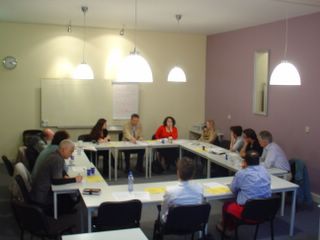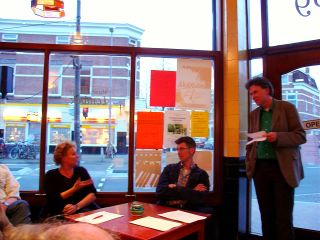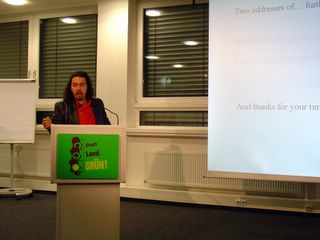Tuesday, April 26, 2005
Sunday, April 24, 2005
Integration, emancipation and the like
Yesterday Saturday 23 the Kleurrijk Platform organized a discussion around the integration question. First among us, and later with the expert in this issue from our parliamentarians, Naima Azough, we debate how much each side of the duo newcomer-resident should fit to each other, and how do we understand the relation inbetween integration and emancipation. And about that second issue is that I’ll write here.
Around a year ago the political leaders of Groenlinks, our delegation in the national congress, produced a nota on the spiny issue on integration. In the last years the presence and adaptation of foreigners of first and even second generation to the Netherlands has been an issue of increased tension and attention. So our party also wrote down her position. When at the Kleurrijk Platform we read the document, we could hardly believe the print. Funnily enough, the Kleurrijk Platform is the workgroup for migrants inside our party, so you could imagine that we were involved in the thinking of a position on integration. That was not so. And we did not -quite- agree with the print.
Our party, undoubtedly, is what you could call an emancipation party. There are plenty of emancipation movements that has been involved with Groenlinks since we exist, and before. And even better, few months before the integration document was written, a broad debate inside our party review our views on emancipation. Not surprisingly, the document on integration was called integration via emancipation. And we migrants inside groenlinks (or at least the organized migrants inside groenlinks) could not disagree more. The relation between integration and emancipation is not oone of cause and effect. As a foreigner, you could be well integrated in a society, and not be emancipated. Or you could be emancipated, and not integrated at all. It is possible to have a good job, a good house, speak the language of the country, pay taxes, participate in the society, then… and have a horrible partner that forces his decisions on you. Integrated and not emancipated. Or you could be perfectly emancipated, deciding your life style, enjoying a reasonably relation and so forth… and being isolated from the society without speaking the language, as many researchers in universities are, afte twenty years living in the Netherlands.
And this discussion is not only about the confusion between cause and effect. Biggest problem is that introducing the view that migrants need emancipation in order to be integrated… we are actually saying that migrants are subject to compassion, people that need rescue and help. Kind of funny. The right wing in Europe presents the migrants as dangerous. And we, part of the progressive wing, think of the migrants as pitiful.
I understand the temptation, of course. As lefties, we tend to focus in oppressed minorities, and we tend to try to do what we think is good for them. When the process goes fine, them minorities are an integral part of us political party, so we all actually go in the same direction. Now the automatic relation in between emancipation and integration, seems to me nothing else than that, an automatic left wing reaction. They are a minority, so they should have problems, and we will emancipate them! Even if it is surely better than the right wing reaction -they are foreigners, so they should be kept outside- it is my opinion that groenlinks still have much to mature in this issue, and produce new options and solutions, instead of left wing reactions.
Friday, April 22, 2005
ALV groenlinks utrecht
The dusk is getting along, we are fully in the twilight, and an ALV starts. That is the assembly of our local party to decide relevant issues. It is sort of interesting that the time that we groenlinksers choose for our meetings is -at least in the summer- the time that most of the Nordic literature identifies with the opening of the doors. The doors to the other world. In any case, Loki disguised and among us or not, we discuss politics at the twilight. And now and then, we perceive the clashes of different worlds.
The last ALV had as a central topic the coming local elections, in about a year from now. The current city councilors of our party were “interviewed” and gave us their pleasures, their satisfactions and their challenges in the city council. And, as in any other meeting that I have seen, when similar topics have been aired… we have a view from the city councilors and another view from the active members of the party. In this case, the discussion did spin around our roots. Are we well recognized and present in our city? Most of our local leaders think so. And most of our active members do not.
This difference of opinion is extremely interesting. To say it from the start, I am convinced that our city councilors invest a relevant amount of their time in the street. Organizing or participating in a full array of events, they are “out there”. The problem is that they are there, without the rest of the party.
Luckily enough the Netherlands politicians, or at least the Groenlinks politicians, are extremely aware that they are not accountable to the party. They are accountable to the ones that elected them, and those are the people, not the party members. Luckily because there is little chance for the elected politician to end up as a party puppet. But not all is good luck. The bad side is the dislocation in between elected politician, whom are natural leaders or the party, and the party herself. Many of our elected politicians simply do not have time to invest in the organization of the party. And there we go into a vicious circle, since active members begins to distrust the elected people, and the elected people go further and further away from the party members. And we end up in an ALV irritating the other.
Is this cleavage to be solved? Luckily yes. In the debate, the two city councilors that repeatedly acknowledge the presence problem that our party has, are also the two councilors that invest most of their time involving the party in the city council. And of course, at working together even the most different worlds intersperse each other. Members of the party that work with these councilors are also the ones with a positive opinion of the role of our party in the street.
One could certainly ask if interacting people are confounding each other, believing that our party is doing better when actually is doing worse. But that is beside the point. Because what really matters is to have a collective of people that wants to work together. Not necessarily because we agree, but surely because we respect our own roles.
So the twilight has become night and we drink the last beer and smoke the last cigarette thinking that the clash of the worlds produced new doors. That was a twilight not gone in vain. Now we just have to walk through.
Thursday, April 21, 2005
Hannover: talking about Dutch multiculturalism, in Germany
Utrecht-Groningen-Hannover, and back to Groningen: traveling with the green party!
In the extreme, politics is a local activity. Den Haag, Brussels or Berlin are cities that are mostly far away. It is said that the task of the politician is to bridge this distance. And now, sited in a German train, I m busy doing exactly that. This particular trip started yesterday morning, waiting for a delayed train in the Utrecht station. Few hours and plenty fried potatoes later I was shacking hands with Harrie Miedema (http://www.groenlinksgroningenstad.nl/afdeling/fractie.shtml and scroll down), a member of Groenlinks Groningen. And an hour later, we were sited in the auto of Nikolaus Schutte zur Wick (http://www.gruene-niedersachsen.de/personen_frameset.html and then look in landesverband), driving to Hannover, and to the congress of the greens in Niedersachsen.
The reason for an argentinian, a dutch and a german to be traveling together to a political meeting of the greens is relatively recent. An initiative of greens from different countries, the Heerlen group, has in the few last years started to establish -or to recognize- networks in between regional green parties across the border. In the particular case of Niedersachsen and Groningen, this collaboration is very active since the last European election. A congress of the german greens has happened in groningen, reciprocated later by several groenlinks activities hosted by the germans. And of lately, in each congregation of the green party guests from the neighboring country are welcome and actively invited. Which is what brings me in the picture. In the congress 'Stadt, land, groen', I was invited to talk about the multicultural question in the current Netherlands. A talk of which I will not write here, but from which you can see the sketch in a powerpoint presentation (http://www.scicha.org/GL/doc/Hannover.ppt). And that is what the photo above is about, also.
What I do want to write here about is the extremely interesting, not to say wonderful experience of cross a border, this time to attend a political meeting.
One of the starting points of greens politics is the concept of the region. In the intermingled and localized identities of European peoples of today, it is almost a truism to say that two border-towns share more than any of them and the capital of the respective country. And that is undoubtedly true for most local political enterprises. Geography and culture make that, for example, the ecological preservation of a delta, like the delta of the Mosselle is a task for the people that live there, which happens to be peoples belonging to three different countries. So their local networks play a most relevant role, more relevant than the role of each national government.
What is interesting to say here is that on top of this regional identity, the national identities remain present and perhaps reinforced. And that is why to walk in to a green -german- meeting is also to enter in another world, a different world of the Dutch evening discussion. Take a look at the agenda of the congress that I attend, for example. Discussions started at midday and were not due to an end before 9 pm. Which was more a pause than an end, since as usual politics continue long into the diner and well into the beers, later.
Or take the style of the speakers, perhaps the most remarkable difference. I have hardly heard an address in the Netherlands going for more than twenty minutes. And in Hannover I sit to hear speakers that would gloss for an hour and more without problem, reviewing not only their key issues, but more interestingly, establishing a rapport with the public, a conversation at best.
It is fair to say that in each exchange of information the players should make different tradeoffs. If you choose for length and conversation, it is likely that you will loose full attention from your audience. But the choice for short and sketchy presentations also looses -at least some of- the pleasure that I had last night, refreshing the little german that I learned years ago, with the at times conversational, at times emotional, at times powerful addresses that leaders of the german greens gave to their members.
As the amateur sociologist that every politician is, we could now do some little analysis of the reasons, the cultural differences that bring about this difference of two close neighbors, such as the greens of the netherlands and the greens of germany. One could mention the long humanistic tradition of germany, and compare it with the traditionally pragmatic and down to earth style of dutch people. But I feel that such an analysis would loose some of the mere thrill of, once more, cross the border and check other cultures, other answers to the same questions that, at each side of the border, keep us being busy with our, paneuropean, green party.
Sunday, April 10, 2005
a conference on a saturday, 9 april
The sun is shinning and I am walking in what comes to me as early morning, to a conference room. It’s a perfect day to have a Groenlinks’ conference. We are the green party after all, no? Even in this country ridden by rain, sometimes there is good weather.
Our party has months organizing this conference. In about a year we are facing local elections, and then each city with an active Groenlinks party gets around organizing a list of candidates for city councilors, writes a program, do the campaign and eventually get into the city council, or even in the local government. Accordingly, the national party offers some sort of structural support. That is the conference in which I am walking into now.
This occasion is a perfect spot to explore that very interesting tension of any political -national- party. For example, “what do those guys in the capital know about our real situation here in the countryside?” Or… “Why those members of the smallest city, with 15 members in their local party demand so much?” This tension, in many cases, exists as a source of mutual frustration. Plenty of distrust exists in both fields towards the other. At best there is some sort of mutual disinterest, which today is being more or less broken. And when the disinterest is broken, very interesting things happen.
For example, I am sitting in a table with information from the Europa workgroup. Nothing is most remote to the local activist. But with the few people that gets closer, mutual surprise occurs. Close to the Europa werkgroep of Groenlinks we run the Heerlen group, which is a network of local greens across the national borders. From the very conception of the Green movement there is speak of an Europa of the regions, instead of an Europa of the nations. There is more in common with people living at either French or German sides of the Rhine, than in between that people and Paris or Berlin. So networks of local activists are interesting, because they share not only political goals, but also location realities. Then in the Saturday conference I could exchange lots of information about existing networks. People got surprised about a national workgroup running something actually interesting for them. And I got surprised about the number of many other existing networks.
Walking back to the train that would bring us back to Utrecht, we were laughing about a comment that our assistant in the Utrecht city council received. In a workshop on networking, he stood up to say something, presenting himself first “I am the assistant to the party in Utrecht, a city with 1200 party members”. The next intervention in the workshop started “I am so tired to hear about cities with thousands of members! My city is small and we have only 20 members!”. So some of the tension is not only city-country, after all.
Wednesday, April 06, 2005
De werkvloer, a MKB workgroup of GL
Yesterday morning was busy with GL meetings at the landelijke bureau. Bas Roufs and I talked first with Marloes Morhuis and then with Gerrit Pas. The issue at hand was the starting of a new landelijke workgroup, De Werkvloer. We are convinced that GL can and should be more involved in economical discussions. The MKB sector is a natural starting point for Groenlinks. Small and Medium Companies belong to that old and battered slogan, small is beautiful. We think that even if old and battered, we still have a lot to do with it. “De Werkvloer” then, aims to be a workgroup to deepen the economics of Groenlinks regarding small and medium companies… among other things.
Our meetings showed up one of the faces of GL that make me still excited about being a member. Marloes is an employee of the party for workgroups support, and Gerrit is a senior employee at the scientific bureau. Bas arranged the meetings a while ago. Our conversations could have hardly been nicer. We got advice about the next steps to formalize our initiative, and far more important than that, we just feel that our party welcome initiatives from the members.
I am quite convinced that if all the initiatives that I have heard in the past two years would have the same encouragement that we got, we would be in a far better party. How good an initiative is, does not matter that much. Indeed, along the past interviews and other exchanges before, we were warned about plenty of points that could go wrong with our workgroup. Much more important, a political party should be a bridge in between people and government. Then, when persons approach one party with ideas and time to invest, the party cannot but help and support (considering that the proposal at hand is minimally acceptable). I have seen too little support in the past for other initiatives, far more brilliant that ours. And I wonder why is not always that people with ideas and time are better received inside our party. Yesterday, then, was a very nice day. Now we have the months to come to show that besides the ideas and the time, we do have something to deliver.
And that is why we are Groenlinks members, toch?
Tuesday, April 05, 2005
After
Ledenberaad and beers done and drunk, back at the keyboard. So, was it nice? Of course. And again, I miss something.
Surprinsingly enough, a member of the party showed up contradicting the position of one of our parliamentarians regarding the building of a big and modern hospital in the center of Utrecht. Our parliamentarians are more or less in favor, our member is against. As the discussion developped, I was explained that the task of a Groenlinks politician is not to take sides in estetic decisions. So the argument that the new building might be an estetic catastrophe for the city was not so good received. The ultimate reason is that already exist a commision of professional planers in the city council, and they, not the politicians, should make this decisions.
Does that makes sense? not to me. A politician should be able to argue what kind of estetic his or her city has. Politicians are precisely the bridge between "the people" and "the professional planer". If Groenlinks leave this discussions to a commision, we might become commision politicians... not such a desirable standpoint, in the tradition of a outspoken party as we.
Monday, April 04, 2005
tonight 4 april, ledenberaad
Ledenberaad
Another meeting of Groenlinks, this time Utrecht afdeling. Starting at 21:00 tonight, our Fractie in the Gemeenteraad calls interested members to discuss actuality issues.
Interesting meeting point, a ledenberaad allows you to see who the fractie is, and how they argue. Even more interestingly, it is supposedly build to allow you to feed the fractie discussions. The question is if that happens.
In most of the ledenberaden that I have assisted the issues are specific ones. A meaningful contribution requires expertise in the matter at hand. On the other hand, the political discussions behind the issues are hardly opened. Perhaps active members of Groenlinks are not expected to be politicians, but experts.
Sooner or later, somebody will ask what’s the use of these meetings. An evaluation might compare the minutes of the meeting, and the minutes of the meetings of the city council. Did the final position assumed by Groenlinks parliamentarians change by the discussion in a ledenberaad? For me, that is an open question. But as in any other political party, one can always hope. Tonight we will talk about green in the city, green recreation and the referendum that comes for the city (should shops be open the Sundays?). As I said, one can always hope.




